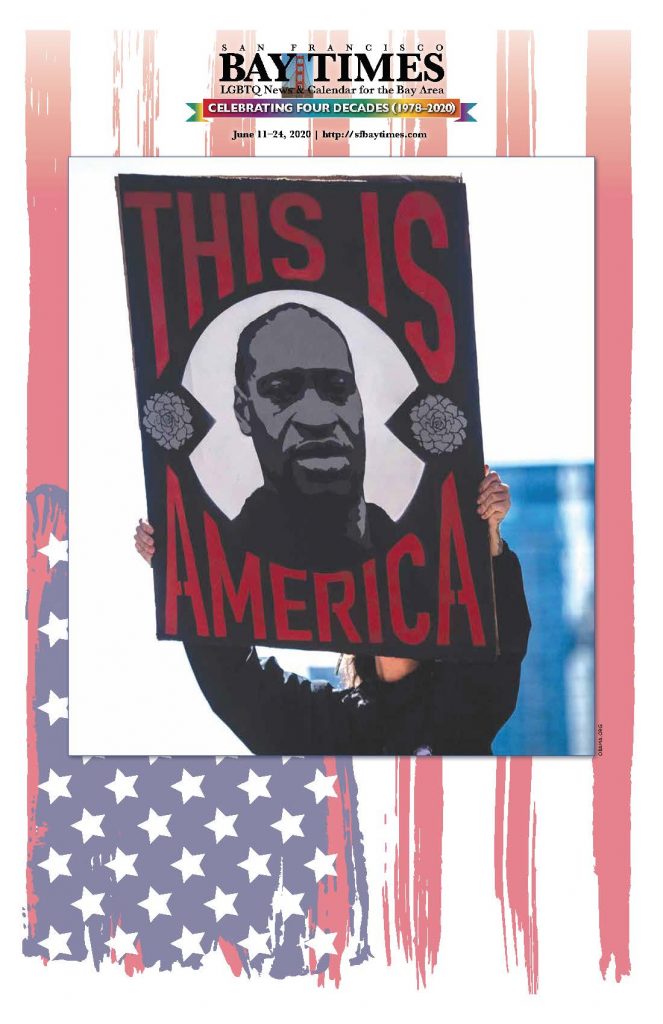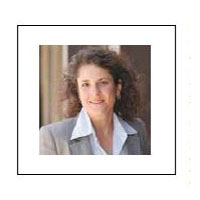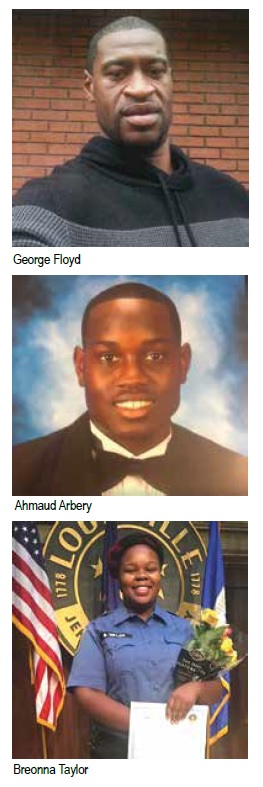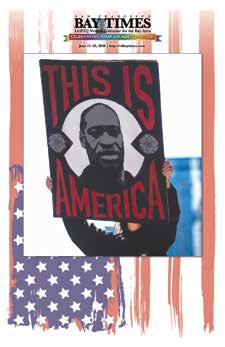

By Louise “Lou” Fischer–
I was horrified by the recent deaths (murders) of George Floyd, Ahmaud Arbery, Breonna Taylor, and those that came before them. I cannot imagine the anguish felt by the families of the victims and the soul-crushing collective pain of the black community.
I’m way past the deadline for turning in this column because I’m suffering from a total inability to focus on one topic when there are so many competing narratives. I’m overwhelmed with sadness, anger, and shame regarding the level of systemic racism in this country; the incessant profiling by law enforcement that results in the murders of innocent men, women, and sometimes children; the callous indifference shown by police and the criminal justice system; and the inappropriate militaristic response by the Trump regime to quash the 1st amendment rights of lawful protesters.
As a public servant (day job), a “bleeding-heart liberal” (according to my father, but I prefer the term “activist”), and a wannabe “fixer” in how I engage with the world (my Meyers-Briggs type is “Protagonist”), my first instinct when I see problems that cause societal harm is to do something: elect the right people to write better laws and enact institutional practices, organize communities to work together, root out bad apples in law enforcement and mandate programs for implicit (and explicit) bias training and de-escalation procedures. The current institutions of power are reinforcing the problem of systemic racism and have completely failed communities of color in this country. How do we, as a nation, overcome racism, prejudice, and the deep-rooted disparities in law enforcement, government, employment, and economic opportunities?
Clearly it is not going to be solved with bloviating and pontification by white people of privilege who have bungled it so badly for the past 400+ years. How about we start with a commitment to learning from the actual victims? While the activist in me wants to jump in and fight, I know that right now, I have to listen and follow the lead of the very people whose personal experiences of racial suffering know better what changes are needed.
As a white woman who has been provided “skin color” privileges, I need to do more than just make sure I’m not manifesting racist attitudes and behaviors; I must seek out and challenge the prejudices in my own circles lest they continue to be woven into the fabric of our culture. Black people have suffered long enough under a broken system that was built by white people.

In a recent entry in The Lily, a newsletter published by The Washington Post, actress and BLM activist Nicole Ruthmarie Watkins posted “An open letter to my nonblack friends: My life matters more than your comfort” that calls this out in blunt detail (edited for brevity): “Your ancestors have benefited from the racism against black people … white people were the looters first [who] looted the whole world for spices, for black and brown bodies, for land, white people are still the looters now. Your silence … your white allyship without work is no longer acceptable, your passiveness is no longer acceptable. More is needed, more is expected, you are either for black lives or you are not. My life matters more than your comfort.”
Fellow white folks, I’m calling you out; we need to listen and educate ourselves to use our privilege to uplift and elevate black women and men into leadership positions in the workplace, in organizations, and elected office. This means celebrating black achievement, providing resources, and removing obstacles to success. We must work together in solidarity to demand justice and to make the world a better place for current and future generations. We need to ensure that the very people who have suffered under a system of oppression have a voice in the process.
When Alicia Garza created the #BlackLivesMatter hashtag in 2013 in response to the murder of Trayvon Martin, it was intended to shine a light on racial disparities in law enforcement and the criminal justice system. People, do not even try to exchange the word “Black” for “All” or “Blue”—it’s not your movement. When Boston, Las Vegas, and Orlando suffered a bombing and mass casualty shootings, we responded with #BostonStrong, #VegasStrong, and #OrlandoStrong; we didn’t change it to #AllCitiesStrong, so don’t mess with #BlackLivesMatter—either get onboard or get out of the way.
As I say in almost every column, “elections matter”; the only way to effect change is to elect people who are committed to uniting communities and improving the lives of all constituents. Former president Barak Obama addressed this in a recent essay (edited for brevity): “[E]ventually, aspirations have to be translated into specific laws and institutional practices—and in a democracy, that only happens when we elect government officials who are responsive to our demands.”
He goes on to highlight the importance of local elections by writing that “elected officials who [reform] police departments and the criminal justice system work at the state and local levels. It’s mayors and county executives that appoint most police chiefs … . It’s district attorneys and state’s attorneys that decide whether or not to investigate and ultimately charge those involved in police misconduct … . If we want to bring about real change, then the choice isn’t between protest and politics. We have to do both. We have to mobilize to raise awareness, and we have to organize and cast our ballots to make sure that we elect candidates who will act on reform.”
If you want to get rid of elected leaders whose response to protestors crying out for change and a stop to police brutality is to send in the military to “dominate the battlespace” and commit more acts of brutality, then you need to vote in every local, state, and federal election. Do the work, educate yourself, and vote for actively anti-racist leaders who are committed to equality and the democratic process. It is literally a matter of life and death.
Louise (Lou) Fischer is a former co-chair of the Board of Directors for the Alice B. Toklas LGBT Democratic Club and has served as an appointed and elected delegate for the State Democratic Party. She is a proud graduate of the Emerge California Women’s Democratic Leadership program, was a San Francisco commissioner, and has served in leadership positions in multiple nonprofit and community-based organizations.

“So much has changed so quickly. And if any of you are confused, or scared, or angry—or just plain overwhelmed—I just want you to know that you aren’t alone. I am feeling all of that, too.”
Michelle Obama shared these words earlier this week with the Class of 2020 and with “everyone out there using their voice to fight for justice right now.”
At this time in June we usually use the full voice of the San Francisco Bay Times to honor LGBTQ organizations, community leaders, and others whose work and sacrifice contributed to the emergence and ongoing evolution of Pride. The June 1969 police raid on New York’s Stonewall Inn sparked a three-day riot that helped to launch the modern-day gay rights movement. The death of 46-year-old George Floyd in Minneapolis on May 25, after police officer Derek Chauvin knelt on his neck for almost 9 minutes, marked another tipping point.
Floyd’s final moments and words continue to tear through the very soul of America and beyond: “Please, please, I can’t breathe.” “I’m claustrophobic.” “I can’t move. Mama, mama, I can’t.” “Please, sir, please. I can’t breathe.”
As a woman-owned business, we remain devastated that Floyd called out to his deceased mother; that he could not be saved because a cruel public official who swore “to protect and to serve” ignored Floyd’s pleas and those of horrified onlookers. We now think of his 6-year-old daughter Gianna, who misses her father but who proudly proclaims, “Daddy changed the world.”
Floyd long had dreams of making a positive impact on others. As a second grader, during the end of Black History Month, he wrote an essay in response to an assignment question: “How will you impact the future? What will you do to make a difference?” Floyd, who then went by his middle name Perry, wrote, “When I grow up, I want to be a Supreme Court judge. When people say, ‘Your honor, he did rob the bank,’ I will say, ‘Be seated.’ And if he doesn’t, I will tell the guard to take him out. Then I will beat my hammer on the desk. Then everybody will be quiet … .”
“He was a good boy,” teacher Waynel Sexton said of Floyd, adding that he was “quiet” and a “delight to have in the classroom.”
Floyd’s dreams changed as his athletic skills became evident. He was a star basketball and football player at Jack Yates High School in Houston, Texas, before winning a basketball scholarship at South Florida Community College (now South Florida State College). Floyd friend Eddy Barlow told The Undefeated, “George was idolized by young boys living in the projects because he was the first guy that many of us witnessed get an athletic scholarship where we grew up. He was one of my role models. He was one of us.”
Floyd’s biggest challenge in sports, according to Yates football coach Maurice McGowan, was that he was too nice. He was a towering 6’6″ tall, and yet he did not want to injure anyone. As his brother Philonise Floyd told CNN, “He’s a gentle giant. He doesn’t hurt anybody.”
With his Supreme Court and sports dreams dashed, Floyd became a truck driver and then a security guard. One regular gig was at the Conga Latin Bistro, where owner Jovanni Thunstrom said, “He was loved by all my employees and my customers.”
Friend and former NBA player Stephen Jackson remembers Floyd as a protector and provider who gave so much to others and yet wanted nothing in return. Jackson, who called Floyd his “twin,” said, “The difference between me and bro was that I had more opportunity than he did.”
And so Floyd, like most of us, did not make headlines. It was not until his horrific death that we even learned about him. We only wish that we could have saved him. His life mattered. His story continues to resonate deeply, such that millions continue to take to the streets both nationally and internationally in his honor to stand up against racial injustice and police brutality.
These turbulent and uncertain times that still also include the global coronavirus pandemic can feel scary and overwhelming, as Michelle Obama said. She added, “To anyone out there who feels invisible: Please know that your story matters. Your ideas matter. Your experiences matter. Your vision for what our world can and should be matters. Your anger—that matters too. But left on its own, it will only corrode, destroy, and sow chaos—on the inside and out. Dr. King was angry. Sojourner Truth was angry. Lucretia Mott, Cesar Chavez, the folks at Stonewall—they were all angry. But they were also driven by compassion, by principle—by hope. And if you hold strong with the same faith that carried all those giants before you toward real, measurable progress—you will change the course of history.”
Published on May 11, 2020
Recent Comments